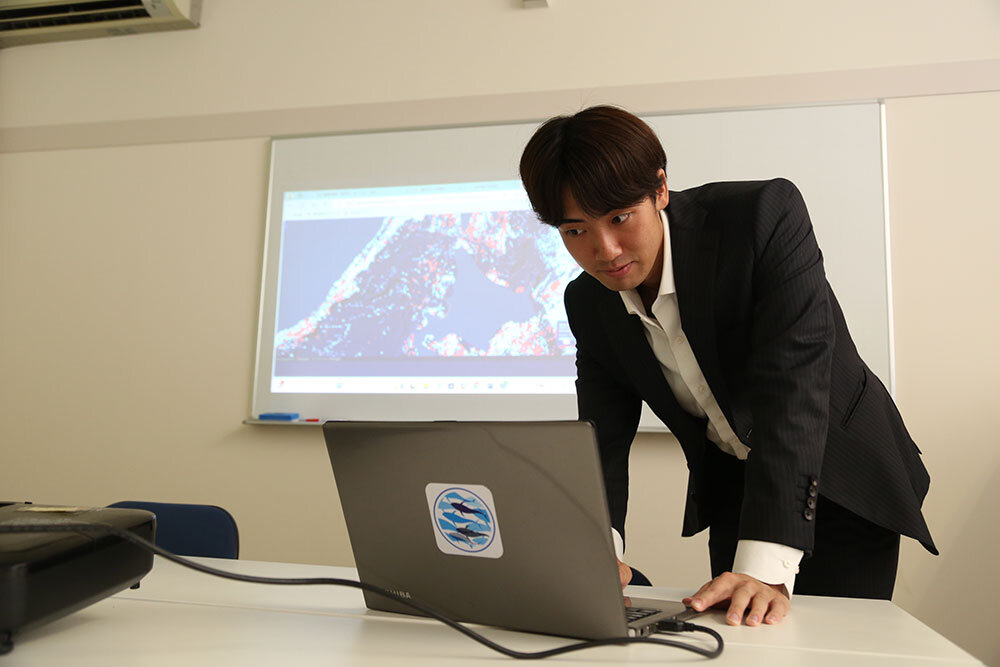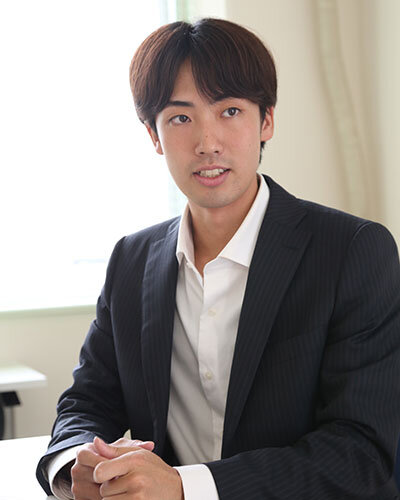INTRODUCTION学生紹介
- HOME
- support
- Student Introduction
- KISHIMOTO MASAMITSU
STUDENT INTRODUCTION
Marine Policy and Management
KISHIMOTO MASAMITSU
Specializations:Marine Policy
Main academic advisor:WAKAMATSU, Mihoko
Mentor:LIANHUI, Wu / KITAKADO, Toshihide

I hope to unravel marine economic activities
Using AI and machine learning to unravel marine economic activities quantitatively
During my undergraduate studies, I researched the conditions under which commercial whaling exists from a qualitative perspective. It was then that I learned that no-take zones were being established to protect whale resources, and I became particularly interested in the area management of such marine spaces. It is the fishermen who are most directly affected by policies that restrict fishing activities in certain areas, such as no-take zones and marine protected areas. I became interested in these changes in fishermen's economic activities and decided to pursue quantitative analysis in graduate school.
I am considering research that reveals marine economic activities using the location information of fishing boats.
There are multiple areas at sea where fishing is restricted, such as marine reserves and areas around offshore wind farms. I will investigate how establishing such restricted areas affects fishing boats' activities by social economical aspects. Until now, it has been difficult to investigate these impacts, but in recent years, research and technology utilizing the GPS of fishing boats have advanced, so I plan to use that information for analysis. I want to use machine learning and AI when analyzing the location information of fishing boats.
This research is interesting because only a few people are doing it. Using machine learning in fisheries management research is still new, and attempts have been made only recently.
Also, a non-profit organization called Global Fishing Watch has created a map that allows visualization the situation at sea. Things that no one knew before are now coming to light, so there may be new discoveries. In that sense, research now is exciting.
Machine learning is a challenge for me, but interesting to try
I joined the WISE Program at the recommendation of my supervising professor and friends. As I wanted to conduct quantitative research in graduate school, I decided to join the WISE Program, where I could learn machine learning.
In the WISE Program, about 30 credits of classes on machine learning and data analysis over two years. I am currently learning the principal machine learning methods in order and trying to determine which ones can be used in my research.
This is my first time studying machine learning. As an undergraduate, I had studied basic mathematics used in economics, but I had no background in advanced mathematics such as machine learning. Therefore, participating in the WISE Program was a challenge for me, but as I studied, I came to understand how interesting machine learning is, where anything can be calculated in an instant. Now that I can see the big picture of machine learning, I can narrow down what I want to learn by saying, "I want to use this method, so I need this method.
The WISE Program offers a variety of learning opportunities
 The WISE Program courses are demanding. I am keenly aware of the importance of having the stamina to learn things I was not previously familiar with. However, I am working with my classmates who are taking the same classes, teaching and encouraging each other. Thanks to them, I am able to maintain my motivation. I would like to continue to value the interaction with other students. I look forward to future events and other opportunities for students to get together.
The WISE Program courses are demanding. I am keenly aware of the importance of having the stamina to learn things I was not previously familiar with. However, I am working with my classmates who are taking the same classes, teaching and encouraging each other. Thanks to them, I am able to maintain my motivation. I would like to continue to value the interaction with other students. I look forward to future events and other opportunities for students to get together.
On the other hand, there are matching events with marine-related companies and research institutes, as well as information on internships. In addition, there are English classes, where students learn practical communication from native English-speaking professors. The Graduate Program of Excellence is extensive and generous in its follow-up to students. I appreciate that very much.
Separating personal life from research to avoid over-absorption
On days when I go to campus, I leave home at 9:00 a.m. and start my research in the laboratory at 10:00 a.m. After attending classes online in the afternoon, I return to my research. Sometimes, I finish around 7:00 p.m., while on some days, I continue my research until late at night or go to the campus on weekends to do research.
However, I have decided to do research only in the laboratory. This is because once I start looking into research-related matters, there is no end to it, and I keep researching endlessly, thinking, "If I investigate a little more, I might find out what I want to know," and I end up unable to sleep. Now, I separate my personal life from my research, and when I leave school, I go running and try to keep my body active or enjoy cooking.
Compared to other industries, the fisheries industry is an untapped area for AI implementation. With research combining fisheries and AI as a foothold, I hope to provide solutions to the fisheries industry using AI in the future.

